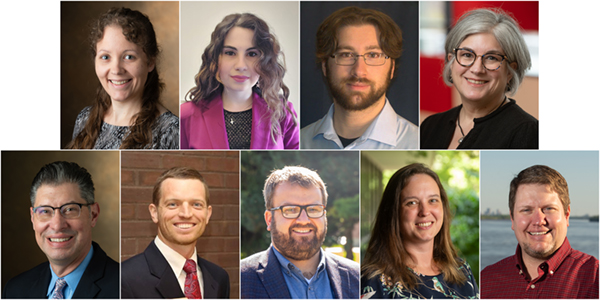Center for Predictive Analytics and IRIS Center for the Digital Humanities Awarded Three Illinois Innovation Network Grants

Two Southern Illinois University Edwardsville research centers received a total of three grants under the Illinois Innovation Network (IIN) Sustaining Illinois seed grant program. Each project will receive $40,000 in funding, marking the first cycle under INN’s new annual structure. The program is designed to increase collaborative research among Illinois’ public universities and SIUE is playing a critical role by securing funding for three research projects.
Carrie Butts-Wilmsmeyer, PhD, director of the Center for Predictive Analytics (C-PAN), led the proposal for “Sustaining Illinois through Safe Drinking Water for All: A Detailed Chemical and Geospatial Analysis of Agricultural and Pharmaceutical Contaminants in Drinking Water Across Illinois Lead Researchers.”
"Access to safe drinking water is essential for community health,” said Butts-Wilmsmeyer. “Our project aims to provide comprehensive data on contaminants of emerging concern, guiding future efforts to ensure clean water for all Illinois residents.”
Butts-Wilmsmeyer’s project addresses the critical issue of safe drinking water by measuring and mapping the concentration of endocrine-disrupting contaminants in public water sources across Illinois. Using advanced chromatography-mass spectroscopy techniques, the team will analyze water samples from all 102 counties in Illinois and create geospatial models to predict contamination levels statewide.
Research co-investigators include Kevin Tucker, PhD, associate professor of chemistry at SIUE and Nicholas Heller, PhD, assistant professor of crop sciences at Illinois State University.
Margaret Smith, PhD, research assistant professor of digital humanities and social sciences in the IRIS Center, is also receiving funding for her “Humanities Futures” project, which will produce resources for careers at the intersection of technology and the humanities.
"Humanities Futures highlights the intersections between technology and the humanities, showcasing the essential skills a humanities education brings to emerging careers,” said Smith. “This project empowers students and strengthens the workforce.”
Smith’s project aims to support undergraduate students from marginalized groups by combining mentorship from faculty and industry partners, technical skill-building and digital storytelling. Students from SIUE and Governors State University will engage in humanities-driven tech careers like data storytelling and civic technology, creating engaging multimodal narratives. Smith’s research is in collaboration with co-investigators Vida Owusu-Boateng, assistant professor of English at Governors State University and Laura Fowler, PhD, associate professor of history at SIUE.
C-PAN researchers are the co-investigators for the third project to receive IIN seed funding for SIUE. “Tweeting to Sustain Illinois Communities: Using Machine Learning to Understand and Improve Social Media Outreach,” was proposed by C-PAN research fellow Bethany Friedrich, MPPA, and Nicholas Guehlstorf, PhD, professor of political science.
Friedrich and Guehlstorf’s innovative machine learning project will explore how local governments use social media to communicate sustainability messages and encourage behavior change. By analyzing sustainability-focused tweets from government agencies using machine learning and natural language processing, the team aims to optimize social media strategies for more effective public engagement.
"Social media is a powerful tool for government communication,” said Guehlstorf. “Our research will help municipalities improve their outreach efforts, promoting sustainable behaviors and better resource management.”
The project lead is principal investigator Colin Kuehl, PhD, assistant professor of political science at Northern Illinois University (NIU).
The IIN Sustaining Illinois program, funded by the University of Illinois System and NIU, supports projects across 15 university hubs. Proposals are selected based on their ability to drive inclusive innovation, equitable workforce development and sustainable economic growth throughout the state of Illinois.









